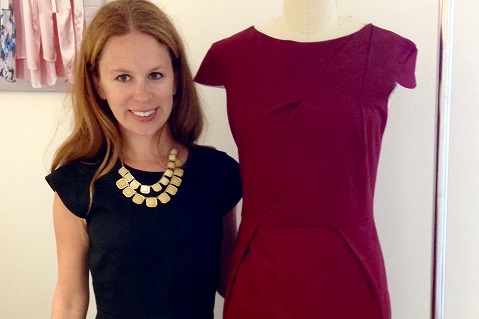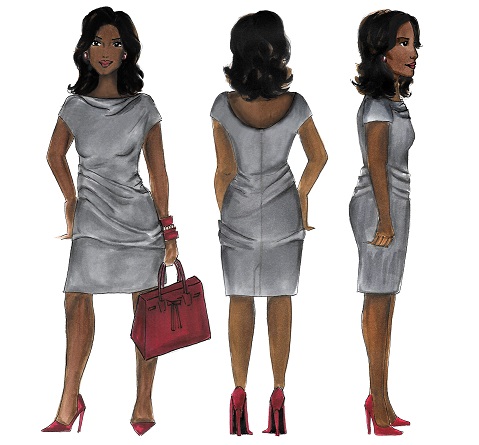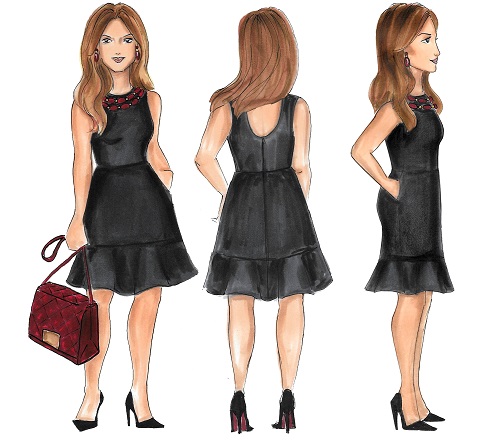Product Hub August 31, 2016
Q&A: Rebecca Ballard Discusses Sustainable Fashion
Maven Women, a new line of socially conscious, eco-friendly clothing for professionals, has a unique approach to the apparel market. Consumers are encouraged to share feedback and vote for their favorite dress designs before they go into production. Wearables spoke to Rebecca Ballard, a lawyer and creator of Maven Women, about her business model, and why fair trade and sustainable sourcing are so important to her.

Q: How did you come up with the idea of Maven Women?
Rebecca Ballard: The idea for Maven Women came to me about a decade ago. At that time, I was a frustrated consumer seeking elegant clothing created in a socially conscious way.
Over the past decade this vision has evolved into a company which brings together:
- My desire to make all of my consumptive choices in line with my values, using my purchasing power as a form of advocacy to create a kinder, gentler world.
- My love of elegance and glamour, and my frustration with limited options for affordable and attractive workwear appropriate for women who work in business formal and business casual environments.
- My passion for advocacy and social impact, combined with my belief that our lives are more connected that we realize and we have more power to create positive change than we know.
I also spent the past decade in dialogue with social impact leaders as well as amazing professional women who shared with me the types of styles they were seeking. This helped us develop our co-creation process, and I encourage you to spend 30 seconds engaging here.
Maven Women is no longer just my idea. It represents the vision of so many women who want better options in terms of both sustainability and style.
Q: Why is sustainable fashion so important?
RB: Fashion is wearable art and immensely practical, something tangible that touches us every day. At best, fashion can empower, elevate and advance each of our lives. It can both preserve cultural traditions and lift our spirits.
The current reality is very, very far from this. Fashion is the second worst polluting industry in the world, after big oil. Conventional cotton uses 25% of the world’s insecticides and more than 10% of its pesticides, polyester is made out of a plastic derived from crude oil, fabric waste is actually treated as toxic waste… and we wear it! Rana Plaza, the worst disaster in the garment industry, occurred just three years ago and killed over 1,000 Bangladeshi workers. The abuse and mistreatment of workers in this industry, the majority of whom are women, is all too common.
It doesn’t have to be this way. Craft work, including artisan production of textiles, is the second largest employer of women in the developing world. More and more socially conscious supply chain partners are popping up around the globe and here in the US. we have an amazing opportunity to take something horrible and turn it into something beautiful.
I’m fascinated by stories of redemption and restorative justice. Sustainable fashion presents us with a powerful, tangible, and exciting opportunity!
Q: What are some of the ways you’re empowering women in your supply chain?
RB: The main purpose of a job is to lift people out of poverty, and no one who is working full time should be impoverished. Fair trade fashion offers a comprehensive approach to poverty alleviation and empowerment and a remedy of the market externalities that exploit those in poverty around the globe. Paying a living wage is certainly an important step, and combined with the other fair trade principles we as consumers are able to do our part to help people lift out of poverty.
The global garment industry is 80% women; however, the vast majority of supervisors are male and discrimination is all too common. Empowering a woman empowers an entire community, and women’s empowerment is also part of the fair trade values. We only work with supply chain partners who share this value, and we also seek partners in the developed world that support this value as well. It may look a bit different in an American urban setting than in South Asia, but it’s a critical value in both places.
We’re excited to have Mehera Shaw as one of our supply chain partners. We encourage you to check out their website and learn more about their commitments to sustainable fashion and women’s empowerment.

Q: Your process is different than many clothing lines, since you give women the opportunity to vote on which items will go into production. Why did you go that route?
RB: I’m both fiercely independent and highly relational. It sounds like a paradox, but I think many women can relate. I hate being told what to do, and I don’t want a trend or a marketing campaign to tell me what is cool or beautiful or flattering on me.
I’ve found that women inherently know what cuts work best for them, and it’s a shame more brands haven’t asked them directly. They are still being told what to wear rather than asked what they want. I also love the idea of women coming together and co-creating.
This process also makes great environmental sense, as it cuts down on wastefully producing clothes that aren’t as appealing.
I love how our co-creation process has demystified the fashion industry and given women a greater sense of agency. Consumers have a sense that the fashion industry is out there, so removed from our lives. It’s really not that way. We have more power than we realize to shape consumptive patterns and create the world we seek.
Q: With items available for presale in the fall, do you have any details on how much they’ll cost and how many pieces will be produced?
RB: Ah, a great question! We are finalizing our supply chain parts and financial model as we speak. However, I can’t just punt and not give you any information. That certainly wouldn’t be in line with our value of transparency.
We are committed to keeping our price point in line with other brands professional women regularly shop from (e.g., Theory, Tahari, J. Crew). We want to make our clothing affordable for as many women as possible, but also pay the true cost at every step. We will also offer deep discounts for people who purchase through presales as a thank you for being a part of the journey.
As for the number of pieces we create, we will aim to match the demand we see in our presales process. If we create more pieces, we can empower and employ more people, advance additional styles and other workwear items (jackets, pants and skirts) with greater speed, and create even more systemic change.


Product Hub
Find the latest in quality products, must-know trends and fresh ideas for upcoming end-buyer campaigns.
